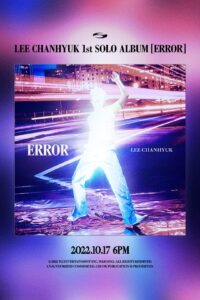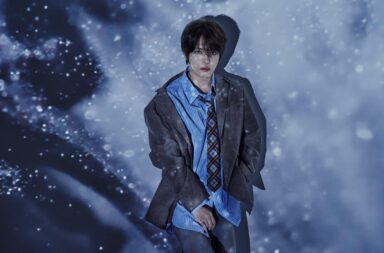
Since their debut in 2014, Akdong Musician (AkMu) has released a string of memorable hits and solidified themselves as well-rounded artists. The sibling duo has been inseparable until Lee Suhyun first ventured solo with the quirky “Alien” in 2020. Little did we know, this experiment marks AkMu’s foray into developing their individual musical identities.
It is without a doubt that much of the mastermind behind AkMu’s music is the eccentric Lee Chanhyuk. As seen in their album Next Episode, Chanhyuk transcended from one artist to another with his brilliant songwriting capabilities and his ability to bring the beauty of a song (such in the case of “Hey kid, close your eyes” with legendary singer Lee Sun-hee) to life. In addition, we actually get to see Chanhyuk in action as an ambitious visionary producer in Netflix’s documentary series, “Take 1”.
For an artist with such amazing talent, it’s been a long time coming for Chanyuk to release an album. And surely, he did not disappoint.
Prior to even an announcement of a solo album, a YouTube channel by the name of Leechanhyukvideo was created around June. It was only, however, by July that a video was uploaded and it was Chanhyuk trying to film himself using his laptop. It was strange, and it gets weirder as more videos were uploaded to the channel. The videos mostly are recordings of him doing nothing or spacing out for 20 minutes—day and night drives or standing under the sun or in the middle of the road.
Then things began to change with the last two videos: a recording of Chanhyuk having a casual morning on a comfy chair in the middle of a busy street and a follow-up of his other activities that transpired during the day. At the release of Error, these forms of performance art become clear in relation to the theme of his album.
Error is about death, which Chanhyuk shares during a press conference that the Korean music scene seldom talks about. The videos, including his random appearance as an audience on National Singing Contest and as a guest for a children’s show, act as a compilation of eyewitness accounts that lead to his untimely death.
The aptly-titled “Eyewitness Account” and “Siren” open the 11-part album with the scene of the accident. Marked with strong techno beats and fast-paced synth-pop, we are transported to the scene when a witness recognizes him from AkMu and calls an ambulance for help. Chanyuk hears the sirens, mimicking their sound in the chorus, as the rescuer struggles to keep Chanhyuk awake.
The third track, “Panorama”, is the album’s lead single and indicates the beginning of Chanhyuk’s new character. Accompanied by a stellar music video, Chanhyuk sings of his old self who was battling for his life while his new character breaks free. While the topic of death can come off as morbid or sad, Chanhyuk sees it as an opportunity to start anew and to give life a second chance.
I needed a track to show how I bid farewell to my old character and welcome the new side of me. It’s also a song that shows that the life that the old me had lived wasn’t honest.
The pinnacle of the album, “Panorama”, continues with the 80’s synthpop from the earlier tracks, but with restraint. “Panorama” is characterized by the use of an 80’s retro synth in mid-tempo, giving listeners an easy listening experience. Chanhyuk’s voice shines in this genre, which hopefully we will get to hear in future AkMu music.

With death being the overall theme, Chanhyuk also shares his honest thoughts and feelings if he ever had only one day to live. “Time! Stop!” is his cry for time to stop and give him another chance. This track leads to another chapter in the album: regrets and farewells. “If I Can’t Go See You Right Now” and “A Day” tell of Chanhyuk’s heart on how he will regret it if he doesn’t see his lover’s face. But then things are headed for a sad turn, as he has to say “Goodbye, Stay Well” which he sings with Chungha, who acts as his girlfriend who he had to part ways with. While Chanhyuk describes it as the most easy-listening track, it’s probably the saddest as they end with, “I was happy.”
Similar to how “Time! Stop!” indicates a transition to a new chapter in his album, “What the” is a pause to reflect on his desire for more. The closer he was to experiencing death, the more he gets to ponder on the things or people that he was about to lose. And the story of “Missed Call” shows just that. In “Missed Call”, he mentions his mom, who he always misses her calls because of his busy schedule. He’s been living alone, describing the loneliness while looking for someone to talk to. But then there’s his mother, who rang him before.
The album does not only contain his regrets of the past, but it also contains his dreams for the future. In “Castle in My Dream”, Chanhyuk set aside the rookie mindset and honestly shared his greed to become a big star and throw his own parties.
As corny as it sounds, celebrities always say they will never forget where they came from and how everything all began. Now that I’m in my seventh year as a singer, I’m starting to think I’m forcing myself into that idea.
But things have changed (since I debuted). I’ve realized I wanted to be the king, although I’ve tried to be humble. The words to the song talk about how I want to build my own castle, host parties there, and invite people to come over. Maybe that’s the life I’m dreaming of at this point.

Finally, the album ends with a funeral. With “Funeral Hope”, Chanhyuk includes a choir and a few notes of inspiration from African American Gospel Music. While there are people who see him are sad, he regards it as a joyous celebration. He is greeted by a choir that sings “Hallelujah!” as he enters heaven.
With his honest thoughts and feelings about life and death, Lee Chanhyuk’s Error is a peak inside the mind of the genius singer-songwriter, away from being the other half of AkMu. (His music show promotions are genius, too.) Often seen as a free-spirited soul, Chanhyuk shows the “push-and-pull” of the human desire to live as well as to pass on. It is for this reason he decides to name his album, Error, an open book of his thoughts about life and death.
(YouTube [1][2][3]. The Korea Herald)


